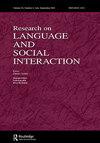Newsmark类型的响应邀请什么?德国echt之后的反应空间
IF 2.1
1区 文学
Q1 COMMUNICATION
引用次数: 7
摘要
摘要:这项对话分析研究考察了在共同呈现的德语互动中,通常与“新闻标记”联系在一起的反应性echt(“真的”)。在不同的用途中,echt转弯是一种将另一个参与者前一个转弯中的东西主题化的练习,无论多么短暂。但这种主题化以系统不同的方式塑造了反应空间:Echt转向可以用来(a)邀请简单的再确认,(b)邀请主题阐述,或(c)寻求一种解释,以调和不同的期望或管理可接受性问题。我们展示了echt转向的设计和参与者的认知定位如何影响echt转向如何被处理和塑造互动轨迹。通过使用“邀请”下一个行动的概念,我们强调了在第二立场行动之后,特别是在“新闻标记类型”回应之后,将回应相关性概念化为梯度的重要性。数据取自日常和机构互动,并以德语和英语翻译呈现。本文章由计算机程序翻译,如有差异,请以英文原文为准。
What Do Newsmark-Type Responses Invite? The Response Space After German echt
ABSTRACT This conversation analytic study examines responsive echt (“really”), which is commonly associated with “newsmarks,” in co-present German interaction. Across uses, echt-turns are a practice for topicalizing, however briefly, something in another participant’s just-prior turn. But this topicalization shapes the response space in systematically different ways: Echt-turns can be taken to (a) invite simple reconfirmation, (b) invite topical elaboration, or (c) solicit an account either to reconcile diverging expectations or to manage problems in acceptability. We demonstrate how both the design of echt-turns and participants’ epistemic positioning matter to how echt-turns are treated and shape interactional trajectories. By using the notion of “inviting” a next action, we highlight the importance of conceptualizing response relevance after second-position actions, and specifically after “newsmark-type” responses, as a gradient. Data are taken from everyday and institutional interaction and presented in German with English translations.
求助全文
通过发布文献求助,成功后即可免费获取论文全文。
去求助
来源期刊
CiteScore
7.30
自引率
7.40%
发文量
20
期刊介绍:
The journal publishes the highest quality empirical and theoretical research bearing on language as it is used in interaction. Researchers in communication, discourse analysis, conversation analysis, linguistic anthropology and ethnography are likely to be the most active contributors, but we welcome submission of articles from the broad range of interaction researchers. Published papers will normally involve the close analysis of naturally-occurring interaction. The journal is also open to theoretical essays, and to quantitative studies where these are tied closely to the results of naturalistic observation.

 求助内容:
求助内容: 应助结果提醒方式:
应助结果提醒方式:


